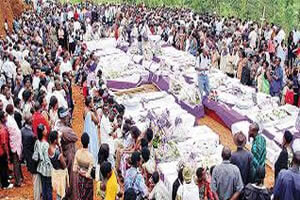IN spite of the absurd 24-hour curfew placed on the Southern parts of the troubled Kaduna State, there hasn’t been any noticeable reprieve yet for the people. Reports of incessant killings have trailed the curfew, raising doubts about the efficacy of curfews in restoring peace and security in the state, or any state for that matter where the undercurrents of injustice and hostility are not comprehensively addressed.
The curfew was imposed in Jema’a, Zangon Kataf and Laura local council areas following a protest that led to an uprising in Kafanchan. Although it was briefly relaxed during the festive period, it had to be resumed ostensibly to avoid the breakdown of law and order. The Christian Association of Nigeria (CAN) has described the killings in Southern Kaduna as sectarian, adding that the 24-hour curfew was a wicked ploy to make the Christians who occupy the zone sitting ducks for their Islamic aggressors.
The whole episode of mindless violence actually smacked of deliberate failure of intelligence on the part of the security agencies in the state, Governor Nasir el Rufai being the Chief Security Officer. His allegation that the Niger Delta militants were the masterminds of the killings was not only fatuous and absurd; it blew the crisis beyond the borders of the state and out of proportion. What could the Niger Delta militants gain from the massive killings in the distant Kaduna State? In what way could the killings further their interests?And were they responsible for the killings of previous decades?
In any case, the reaction of the Miyetti Allah Cattle Breeders Association of Nigeria (MACBAN) to the violence and killings in the region, explaining that they were in retaliation for the killing of some Fulani persons in the aftermath of the 2011 presidential election and suing for peace through mutual forgiveness between the two groups, speaks volumes about the direction of an objective narrative of the events, contrary to the claims of the governor. Speaking at a press conference last weekend, the Assistant National Secretary of the association, Dr Ibrahim Abdullahi, called on the people of the area to forget what had happened in the past and move on. “This crisis will never end if you think you can go and revenge what happened to you, so we’re appealing to all parties to sheathe their swords and embrace peace,” he said.
Meanwhile, it is instructive that the Christian Association of Nigeria (CAN) has declared January 8, 2017 as a national day of mourning, while MACBAN has declared support for the steps so far taken by the government of Kaduna State and all the security agencies aimed at ensuring the return of normalcy in the crisis-ridden area. It remains to be seen what kind of peace can return to an area governed by such obviously grave injustice.
The citizens of Southern Kaduna are known to be Christians and farmers; in fact, the area is reputed for being one of the food baskets of the country and the displacement of these farmers can only spell their death knell, in addition to the grave damage that would be done to both the state and national economy. As things stand, it is pretty obvious that, on account of his jaundiced proclivities and ethnic bias, the governor of Kaduna State has failed to protect the citizens of the state, contrary to the oath he swore to during his inauguration. Instead of coming up with innovative and creative ideas about securing the state, he chose to play the ostrich, trading blames with the Niger Delta militants.
If the press conference held by the MACBAN is assumed to be an admission of guilt and culpability, its recommendation of mutual forgiveness between the natives of Southern Kaduna and its transgressing members is totally absurd and unacceptable because no human society can be predicated on such grave injustice. The violence in Southern Kaduna which occasioned deaths and maiming was purely a law and order issue and the felons must be made to face the full wrath of the law. That is the only recipe for peace as far as we know.





